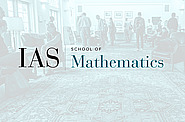Seminars
Oct
07
2013
Computer Science/Discrete Mathematics Seminar I
Stanley-Wilf limits are typically exponential
Jacob Fox
11:15am|S-101
Sep
30
2013
Sep
24
2013
Sep
23
2013
Computer Science/Discrete Mathematics Seminar I
Using the DFS Algorithm for Finding Long Paths in Random and Pseudo-Random Graphs
11:15am|S-101
